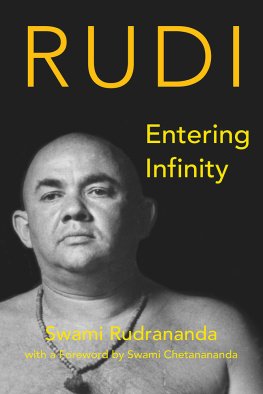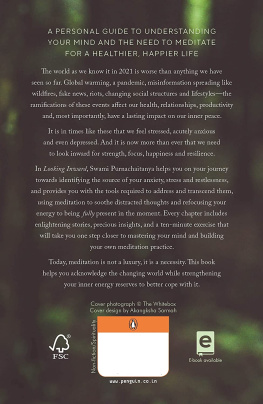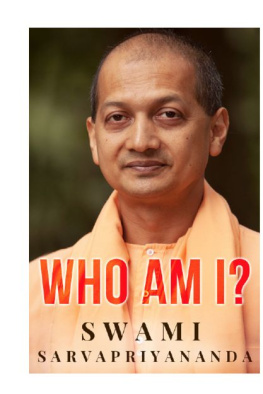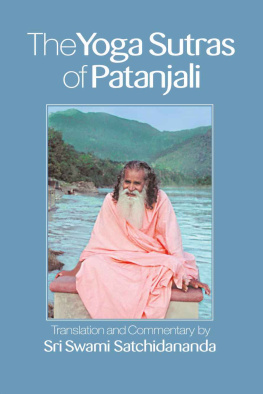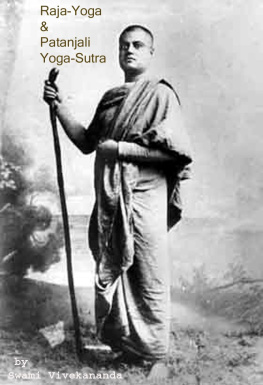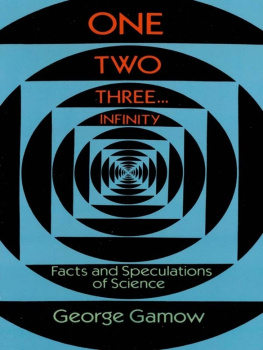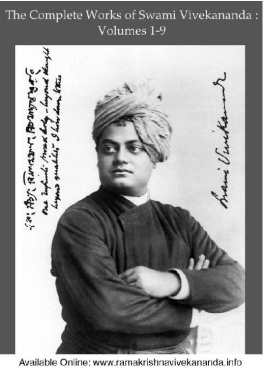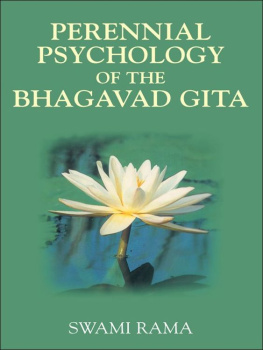Swami Rudrananda [Rudrananda - Entering Infinity
Here you can read online Swami Rudrananda [Rudrananda - Entering Infinity full text of the book (entire story) in english for free. Download pdf and epub, get meaning, cover and reviews about this ebook. year: 2017, genre: Religion. Description of the work, (preface) as well as reviews are available. Best literature library LitArk.com created for fans of good reading and offers a wide selection of genres:
Romance novel
Science fiction
Adventure
Detective
Science
History
Home and family
Prose
Art
Politics
Computer
Non-fiction
Religion
Business
Children
Humor
Choose a favorite category and find really read worthwhile books. Enjoy immersion in the world of imagination, feel the emotions of the characters or learn something new for yourself, make an fascinating discovery.
- Book:Entering Infinity
- Author:
- Genre:
- Year:2017
- Rating:5 / 5
- Favourites:Add to favourites
- Your mark:
- 100
- 1
- 2
- 3
- 4
- 5
Entering Infinity: summary, description and annotation
We offer to read an annotation, description, summary or preface (depends on what the author of the book "Entering Infinity" wrote himself). If you haven't found the necessary information about the book — write in the comments, we will try to find it.
Swami Rudrananda [Rudrananda: author's other books
Who wrote Entering Infinity? Find out the surname, the name of the author of the book and a list of all author's works by series.
Entering Infinity — read online for free the complete book (whole text) full work
Below is the text of the book, divided by pages. System saving the place of the last page read, allows you to conveniently read the book "Entering Infinity" online for free, without having to search again every time where you left off. Put a bookmark, and you can go to the page where you finished reading at any time.
Font size:
Interval:
Bookmark:


Portland, Oregon
Rudra Press
P.O. Box 13310
Portland, Oregon 97213-0390
rudrapress.com
Copyright 1994 by the Nityananda Institute, Inc.
Reprint edition 2017 by The Movement Center, Inc.
All rights reserved. No part of this book may be reproduced or utilized in any form or by any means, without permission in writing from the publisher.
Compiled and edited by Cheryl Berling Rosen
Book design by Guy Boster
Cover design by Patty Slote
ISBN: 978-0-9983389-1-0
eISBN: 978-0-9983389-0-3
Manufactured in the United States of America.
Library of Congress Cataloging-in-Publication Data
Rudrananda, Swami, 1928-1973
Rudi: entering infinity/Swami Rudrananda (Rudi): foreword by Swami Chetanananda: edited by Cheryl Berling Rosen.
p. cm.
Includes bibliographical references and index.
ISBN 0-915801-89-2
I. Rosen, Cheryl Berling. II. Title III. Title: Entering infinity.
BL624.R7934 1994
294.544dc20 92-45648
CIP
R U D I
ENTERING
INFINITY

Photo by Barry Kaplan
The more you grow spiritually, the further you go away from the earth. You begin to understand that there is no end and no limitation. Just as if you took off in a rocket ship, you finally see yourself diminish and disappear. And you are in spacedeep inner space. This is infinity.
Rudi
FOREWORD
If you, the Reader, have never heard of Rudi, then I will tell you he was a uniquely special and influential American spiritual teacher and yogi. He was born Albert Rudolph in Brooklyn in 1928 and died in a plane crash in 1973 in the Catskills, and while short, his life was of great consequence.
Many things made Rudi special. To my knowledge he was the first American to become a swami in Indias ancient Saraswati monastic order. In recognition of his work as a spiritual person, he was renamed Swami Rudrananda. However for me, his contact with the creative energy of Life was more important. This contact allowed him to transmit his experience of that energy to those around him, take on their inner tensions and obstructions, and give them an extraordinary teaching in return. He was, quite frankly, amazing.
Rudi brought a new spiritual practice to our culture that, while simple and grounded in ancient tantric practice, was not particularly easy. He first encountered it in the late 1950s when he met Bhagavan Nityananda in the tiny village of Ganeshpuri near Bombay, where an ashram had grown up around this Indian saint. In a room lit by a few bare light bulbs, Nityananda would sit silently with his eyes open. Droves of people came every day because in India seeing and being in the presences of a spiritual person is considered a blessing. This encounter is called darshan, and as Nityananda sat with his eyes open, he established a connection with each person according to his or her capacity to experience and maintain that contact.
This eyes-open practice is powerful and significant because it trains us to see the world and its diversity as it is. With eyes open, we dont shut out the world and retreat from it. However, most people find such diversity to be a source of confusion, attraction, repulsion, ambivalence, pain and suffering, and desire. But with our eyes open, we see into it and through it to the fundamental power that underlies the field of our experience.
To do this means we learn to center ourselves within this realm of diversity. We learn to open ourselves to its pulsation and to the flow of creative energy in our lives. In fact, this interchange is our life in a physical sense: we need food and water. It is our life in an emotional sense: we have contact with others. It is our life in an intellectual sense: we collect, structure, and give information. And, finally, it is the Life of our lives.
In this eyes-open practice, we dont close ourselves off from or deny anything. Instead, we open ourselves fully to experience the source of all diversity, seeing through all that complexity to the fundamental, simple power that is the essence of all there is. Through this openness, we learn to absorb each experience as nourishment and not reinforce the trauma in our lives. Good and bad experiences alike are food to nourish our vital force and allow us to grow as spiritual human beings.
During the years since Rudis passing, the vital force that was the essence of his teaching remains undiminished. The particular flavor and form he gave it remind those of us who knew him of his presence every time we sit in meditation, every time we digest lifes daily tensions and pressures the way he taught us to. And within the teaching we received from him is the teaching that he in turn received from his teacher Bhagavan Nityananda.
This book, aptly called Entering Infinity, is com-posed of talks that Rudi gave to his students. They were recorded in 1972 and 1973 in the meditation room of his Manhattan brownstone on East Tenth Street or at his ashram in the Catskill Mountains at Big Indian, New York.
These talks always followed his teaching of an eyes-open meditation class and his words were an extension of the flow of spiritual energy pulsating through him. From his own state of profound surrender Rudi spoke, planting seeds of understanding that would grow and flourish over time in the hearts of those around him.
Rudis hard work and personal sacrifice made it possible for us to live in the inner dimension he transmitted. In being touched by him, our human experience has been enriched, leaving us in a state of great inner joy. This is because, with our eyes open to life, Rudi taught us to see through the worlds diversity to the infinite creative power underlying it. We see the creative power that manifests as the tensions and trauma, the turmoil, hopes, and fears, and as all the uncertainty human beings face in life. We see it all. And in seeing it, feeling it, and having a living contact with that source of life, we find ourselves released into the freedom and infinity Rudi talked about and in which he lived.
Swami Chetanananda
EDITORS NOTE
The transmission of a teaching is a living thing. One could say that it costs the teacher his or her life. Therefore, the question of authorization is intrinsic to a teaching lineage of the kind into which Rudi poured his whole life. What is being transmitted is the entirety of that energy, that vital force. It is the teacher who determines who is prepared to sustain that force and pass it on, and who is not. He or she may train many students, but this is not equivalent to regarding them as ready to carry on the level of the work.
While Rudi was alive, he designated two people to teach under him: Swami Chetanananda, now in Portland, Oregon, and Stuart Perrin, now in New York. Before his passing, Rudi wrote a letter in which he assigned Swami Chetanananda the task of carrying on his work and taking over the direction of the ashrams he had established. Even now, any authorized teacher of Rudis work must be someone directly connected with either Swamiji or with Stuart. Anyone else who claims to be a teacher trained by Rudi is self-proclaimed.
R U D I
ENTERING
INFINITY
1. CHANGING OUR STATE OF BEING
Only by refining the atmosphere around us, by being able to absorb life consciously, does our state of being change. It is not consciousness, but rather an inner chemical process that finally comes about. Ultimately, what it is giving you is not a state of you or me, it is a state of being. It is the maturing of certain energies that have been flowing for many years.
Next pageFont size:
Interval:
Bookmark:
Similar books «Entering Infinity»
Look at similar books to Entering Infinity. We have selected literature similar in name and meaning in the hope of providing readers with more options to find new, interesting, not yet read works.
Discussion, reviews of the book Entering Infinity and just readers' own opinions. Leave your comments, write what you think about the work, its meaning or the main characters. Specify what exactly you liked and what you didn't like, and why you think so.

